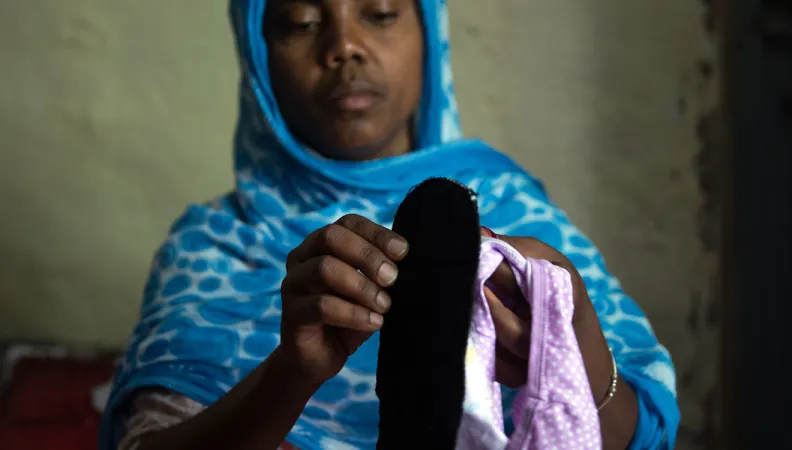Share the page
One way to Reduce Gender Inequality? Menstruation Education
Published on

Development investment has tended to neglect women’s menstrual health. Now, the first French Development Impact Bond (DIB) seeks to change that, by supporting programs that promote menstrual hygiene. On the eve of Menstrual Hygiene Day, we highlight a public-private pilot program in Ethiopia that is working to improve the health and education of women - as well as their autonomy and dignity.
This article originally appeared in February 2021, and has been updated for World Menstrual Hygiene Day on May 28, 2022
A woman spends, on average, 2,280 days of her life having her period. But an estimated 500 million women around the world struggle to manage their menstruation under sanitary conditions. They face not only disinformation, but also difficulties in accessing water, sanitary facilities, and suitable menstrual products. All that trouble is not without consequences: 1 in 10 girls in Africa drops out of school, women are not able to work several days a month and they suffer a 70%-higher risk of vaginal infections.
“In 2019, when France launched its international feminist diplomacy, Agence Française de Développement noted that very little investment targeted menstrual health and hygiene in the countries where we operate,” says Katell Rivolet, Project Team Leader in AFD’s Water and Sanitation Division.
It’s against this backdrop that AFD, in association with the French Ministry for Europe and Foreign Affairs, the NGO CARE France, and the bank BNP Paribas recently signed a Development Impact Bond (DIB) to support menstrual health and hygiene in Ethiopia, the second most populous country in Africa. This DIB finances a three-year program dedicated to this issue and, more broadly, to the empowerment of women as targeted by Sustainable Development Goal 5.
Where knowledge is power
While menstruation is a taboo subject all around the world, this is particularly true in Ethiopia, where three out of four adolescent girls never hear about menstruation until they experience it for the first time. This is one of the reasons why this DIB, with a subsidy of €3 million euros by AFD, was proposed in this country.
The DIB seeks to raise awareness about menstrual health and hygiene in the political sphere, in civil society, and among the general population. Virginie Arnaud Le Pape is Project Team Leader at AFD’s Structured Finance Division. “Thanks to this collaboration,” she said, “a broader discussion on menstrual health and hygiene is taking place, and public policy dialog on the topic with Ethiopian authorities is growing. The ultimate goal will be to scale up the project.”
The program, to be rolled out in the city of Adama and the surrounding area, will be implemented this spring by CARE France, in collaboration with CARE Ethiopia and ProPride, a local NGO committed to promoting women’s rights.
“CARE and its partners ensure that good practices are promoted among a wide audience,” says Helen Pankhurst of CARE International. “We also provide reusable sanitary napkins. In schools, we make sure that sanitary facilities are adapted to the needs of young girls.”
Awareness campaigns will also be conducted in universities, schools, clinics, factories in the city’s industrial park, and in the most vulnerable communities on the city’s outskirts. An impact study indicates these awareness-raising activities will reach approximately 325,000 people.
Measuring Social Impact
For this program, AFD launched a call for proposals and selected the NGO CARE France as the program implementer. The program’s social impact objectives will be measured by an independent evaluator. A private investor, BNP Paribas, was chosen to pre-finance the program and bear the risk of failure of the experiment.
At the end of the project, AFD will reimburse BNP Paribas the capital invested and provide a premium if the results are achieved. If the results are not achieved, the investor may lose its entire stake. “BNP Paribas has already developed and invested in around ten social impact contracts in Europe, but this is our first one in Africa,” says Maha Keramane, Head of Positive Impact Business Accelerator at BNP Paribas. “The DIB is an innovative investment tool that makes it possible to combine all forms of intervention on menstrual insecurity into a single program.”
Measuring impact and improving practices
For the project to be considered a success, coordinators will have to demonstrate that young women and girls are more aware of menstrual health and hygiene and have improved access to period products and suitable sanitation facilities. In addition to short-term progress, the long-term impact will also be assessed.
“For example, we’re not only looking to measure the number of sanitary protection products distributed, but also whether they are used, and how their use affects women’s mobility and the schooling of young girls,” says Sonia Lioret, A Director of the AFD office in Addis Ababa.
Each year, a monitoring committee with representatives from Ethiopian government ministries (Women, Children and Youth; Health; and Education) and from the Water and Sanitation Commission will meet to scale-up investments. As Helen Pankhurst from CARE International says, “This project touches on a major issue that goes far beyond menstrual hygiene: the empowerment of women so that they become more independent and active in their lives.”
